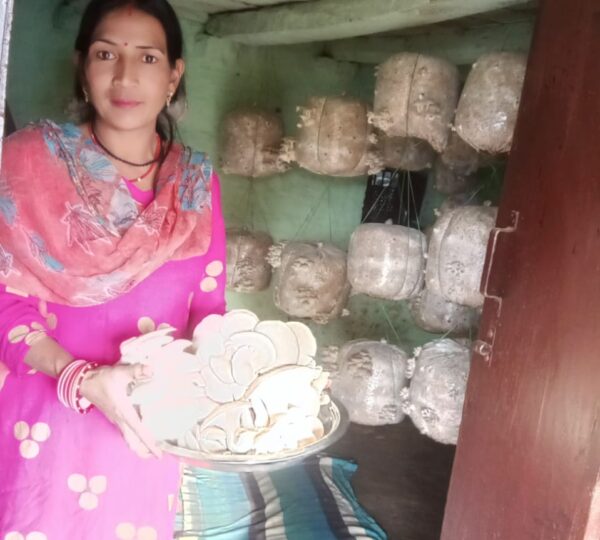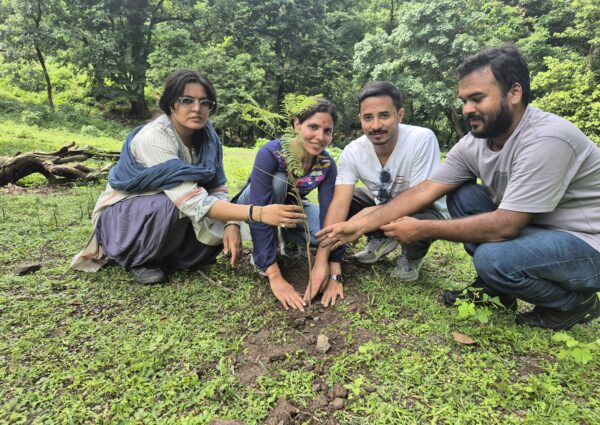- Home
- Our Projects
- 2021-22
2021-22
2021-22
Summary
Sustainable Livelihood and Environmental Conservation Programme
The Green Pahadi Foundation (GPF), in collaboration with the Karuna Social Service Society, implemented the Sustainable Livelihood and Environmental Conservation Programme across the Pauri, Kaljikhal, Pabau, and Kot development blocks of Pauri Garhwal, Uttarakhand. This initiative aimed to uplift rural communities by introducing sustainable livelihood opportunities while promoting environmental conservation practices.
Project Objectives
- To empower rural communities through long-term skill development in income-generating activities.
- To promote environmentally sustainable practices, enhancing awareness of conservation among the local population.
- To provide immediate support for implementing new skills in real-world applications.
Project Implementation
1. Training in Mushroom Cultivation
- Recognizing the potential of mushrooms as a low-investment, high-return crop, the project focused on building the capacity of small farmers, particularly rural women.
- Tailored training sessions were conducted, covering the lifecycle of mushrooms, preparation of growing mediums, and harvesting techniques.
- Participants were introduced to best practices for maintaining crop quality and increasing yield, ensuring sustainable farming methods.
2. Provision of Ready-to-Fruit Mushroom Bags
- To ensure quick results and immediate engagement, participants received ready-to-fruit mushroom bags.
- This allowed them to apply the training directly, reducing the time between learning and earning while building confidence in mushroom cultivation.
Achievements and Impact
1. Economic Empowerment
- Mushroom farming emerged as a reliable source of alternative income, particularly for small farmers and rural women, enabling financial stability and reducing economic dependence.
- The project created avenues for small-scale entrepreneurs to grow their businesses using sustainable methods.
2. Environmental Benefits
- Mushroom cultivation promoted waste decomposition and enhanced biodiversity, raising awareness about environmental stewardship among rural communities.
- The integration of conservation practices encouraged the communities to adopt sustainable agricultural practices beyond mushroom farming.
Long Term Effect
- The project instilled a sense of self-reliance and sustainable development among the beneficiaries.
- It laid a foundation for creating a balanced ecosystem where economic prosperity and environmental conservation coexist harmoniously.
Establishment of Mushroom Unit for State Rural Livelihoods Missions (SRLM) Groups
The Green Pahadi Foundation (GPF) played a significant role in advancing the goals of the Aajeevika Mission, formally known as Deendayal Antyodaya Yojana – National Rural Livelihoods Mission (DAY-NRLM), in the Jaiharikhal development block of Pauri Garhwal, Uttarakhand. This central government initiative aims to combat poverty by empowering rural communities through training, resource allocation, and fostering self-sufficient micro-enterprises.
Recognizing the potential of the mission, GPF implemented a focused project that emphasized mushroom cultivation as a sustainable livelihood option for State Rural Livelihoods Missions (SRLM) groups.
Project Scope and Objectives
- To establish low-budget mushroom growing units utilizing locally available resources, ensuring long-term sustainability.
- To provide comprehensive training and ongoing technical support to SRLM groups for cultivating mushrooms effectively.
- To align with the mission’s goals of fostering economic independence and self-reliance among rural populations.
Project Implementation
1. Establishing Cost-Effective Mushroom Units
- Using easily available resources like agricultural waste, we created affordable mushroom-growing setups tailored to local conditions.
- The low-cost approach made the project accessible and replicable, ensuring more rural families could benefit from it.
2. Comprehensive Training for SRLM Groups
- Detailed training programs covered all aspects of mushroom cultivation, including:
- Understanding the science behind mushroom farming.
- Practical techniques for sowing, growing, and harvesting mushrooms.
- Maintenance and troubleshooting for sustainable operations.
- Continuous technical support ensured participants had access to expert guidance throughout the cultivation process.

Achievements and Impact
1. Livelihood Creation
- The mushroom units provided a reliable source of income generation, especially for women in SRLM groups, enhancing their economic stability.
- Participants gained the confidence and skills to scale up their operations, moving towards self-sufficient micro-enterprises.
2. Community Development
- The initiative fostered a spirit of self-reliance within the SRLM groups, inspiring them to explore further entrepreneurial activities.
- The project strengthened the social fabric by enabling community collaboration and mutual learning.
3. Sustainability and Scalability
- By emphasizing local resources and cost-effective methods, the project laid the groundwork for long-term sustainability.
- The scalable nature of the model ensures that other rural communities can adopt and replicate it, amplifying its impact.
Medicinal Mushroom Cultivation Training Programme
In collaboration with the esteemed Himalayan Action Research Centre (HARC), Dehradun, the Green Pahadi Foundation (GPF) embarked on a transformative initiative to uplift rural and tribal communities in the Jaunsar and Bhabar regions of Chakrata, Dehradun. HARC, an organization dedicated to sustainable development in mountain communities since 1988, shares GPF’s vision of empowering local populations, promoting sustainable livelihoods, and advancing environmental conservation. This partnership aimed to bring cutting-edge knowledge of medicinal mushroom cultivation to these underserved regions, offering an innovative path to economic growth and self-sufficiency.
Project Objectives
- To train 150 farmers in cultivating high-value medicinal mushrooms such as Shiitake and Ganoderma, known for their premium market value and health benefits.
- To introduce beekeeping practices using the indigenous honeybee species, Apis cerana indica, as an additional source of income.
- To empower farmers with technical expertise and practical skills for sustainable income generation.
Project Implementation
Advanced Training in Medicinal Mushroom Cultivation
- Farmers were introduced to high-value medicinal mushroom varieties like Shiitake and Ganoderma, which are globally recognized for their therapeutic properties.
- Training modules covered every aspect of the cultivation process, including:
- Ideal environmental conditions for growth.
- Substrate preparation and inoculation techniques.
- Maintenance, pest management, and harvesting methods.
- The focus on medicinal mushrooms provided participants access to premium market opportunities, offering potential for significant income growth.
2. Diversification through Beekeeping
- To complement mushroom farming, training sessions included guidance on beekeeping with Apis cerana indica, a native honeybee species.
- This initiative added a diversified income stream through the production of high-quality honey and bee-related products, further enhancing rural livelihoods.
3. Comprehensive Knowledge Transfer
- As a technical partner, GPF ensured the training was hands-on and practical, empowering farmers to implement what they learned immediately.
- Expert trainers facilitated interactive sessions and real-time demonstrations to bridge the gap between theoretical knowledge and practical application.
Achievements of the Project
1. Skill Development for 150 Farmers
- A total of 150 farmers from tribal regions were equipped with advanced skills in medicinal mushroom cultivation and beekeeping, fostering self-reliance and technical competence.
2. Income Diversification
- The dual focus on medicinal mushrooms and honey production provided participants with multiple income streams, significantly enhancing economic stability.
- Shiitake and Ganoderma cultivation opened pathways to niche markets, allowing farmers to command premium prices for their produce.
3. Sustainable Livelihoods
- The project promoted environmentally friendly practices, ensuring long-term sustainability in cultivation and beekeeping activities.
- Farmers gained the confidence to independently manage and expand their operations, contributing to the overall development of the region.
4. Community Upliftment
- The initiative sparked a wave of entrepreneurial spirit among participants, inspiring others in the community to explore innovative livelihood options.
Future Outlook
The Medicinal Mushroom Cultivation Training Programme represents a groundbreaking collaboration between HARC and GPF, tailored to address the unique challenges of rural and tribal regions in Chakrata. By combining technical expertise, sustainable practices, and income diversification, the project laid a strong foundation for economic empowerment and community development. This initiative not only introduced participants to high-value medicinal crops but also fostered a spirit of innovation, paving the way for a more prosperous and sustainable future.
Mushroom Training & Low Budget Unit Establishment for NABARD registered women SHGs
The National Bank for Agriculture and Rural Development (NABARD), in partnership with Udyogini, a non-profit organization championing women’s economic empowerment (WEE), launched the transformative “Farm to Fork” Initiative in the Chamoli district of Uttarakhand. This groundbreaking project aimed to revolutionize rural livelihoods by empowering women farmers through mushroom cultivation, processing, and access to profitable markets. To bring this vision to life, the Green Pahadi Foundation (GPF) joined as a technical and implementation partner, leveraging its expertise to enhance the project’s impact and ensure lasting outcomes.
This initiative specifically targeted marginalized women from 25 Self-Help Groups (SHGs) registered with NABARD across the Tharali, Dewal, Dasholi, and Joshimath development blocks. By providing technical training, establishing low-budget mushroom units, and creating market linkages, the project set out to not only improve the economic status of these women but also build their capacity for entrepreneurship and self-reliance.
Project Objectives
- Technical Training: Equip women with in-depth knowledge of mushroom cultivation, from selecting suitable varieties to harvesting and processing.
- Low-Budget Unit Establishment: Support the creation of cost-effective, sustainable mushroom farming units tailored to local conditions.
- Market Access: Develop strong market linkages to ensure profitable sales of the produce and bridge the gap between production and revenue generation.
- Entrepreneurship Development: Foster skills in business management, pricing, and financial planning to help women manage micro-enterprises efficiently.
Project Implementation
Technical Training and Capacity Building
- Conducted comprehensive technical training programs for 150 women from 25 NABARD-registered SHGs.
- Topics covered:
- Selecting and cultivating profitable mushroom varieties suitable for the region.
- Setting up and maintaining optimal growing conditions for high yields.
- Harvesting, processing, and packaging techniques for market readiness.
- Organized entrepreneurship workshops to teach:
- Financial management and budgeting.
- Market analysis and competitive pricing strategies.
- Customer engagement and branding for increased visibility.
2. Low-Budget Unit Establishment
- Designed and implemented cost-effective mushroom units, leveraging locally available resources to minimize startup costs.
- Provided hands-on support for building and managing these units, ensuring women could start their operations immediately.
- Emphasized eco-friendly practices, reducing waste and promoting sustainable farming methods.
3. Market Linkage Development
- Actively facilitated connections between women farmers and reliable buyers, ensuring fair pricing and consistent demand for their produce.
- Established relationships with local markets and urban retailers, enabling farmers to expand their reach and maximize profitability.
- Provided ongoing mentorship to help women navigate market challenges and optimize their earnings.
Achievements of the Project
1. Empowering 150 Women Farmers
- Trained women across 25 SHGs in mushroom cultivation and entrepreneurial skills, enabling them to become independent micro-entrepreneurs.
2. Establishing Sustainable Livelihoods
- Set up low-budget mushroom farming units that serve as a consistent and profitable income source for participating women.
3. Bridging the Market Gap
- Developed strong market linkages, ensuring women farmers could sell their produce at competitive prices.
4. Enhancing Community Well-Being
- Fostered economic empowerment by increasing household incomes and reducing dependence on external support.
- Strengthened the role of women in community decision-making, promoting gender equality and self-reliance.
5. Promoting Collaboration for Rural Development
- Demonstrated the power of partnerships between government agencies, non-profits, and local communities.
- NABARD’s financial support, Udyogini’s innovative approach, and GPF’s technical expertise created a synergistic model for sustainable rural development.
Benefits of Mushroom Cultivation
- Sustainable Farming Practices: Mushroom cultivation aligns with eco-friendly practices, utilizing agricultural waste to grow high-value crops.
- Low Investment, High Returns: Ideal for women farmers with limited resources, mushroom farming requires minimal investment and offers lucrative returns.
- Economic Empowerment for Women: By training women in mushroom cultivation and entrepreneurship, this project contributes to gender equality and women’s economic independence.
- Market Access for Rural Farmers: The project bridged the gap between rural producers and urban markets, ensuring profitability for small-scale farmers.
- Collaborative Rural Development: Showcasing the success of multi-stakeholder collaborations, this project serves as a model for empowering rural communities
Future Outlook
The “Farm to Fork” Initiative has transformed the lives of 150 women farmers in the Chamoli district, equipping them with skills, resources, and market access for a brighter future. By integrating technical training, unit establishment, and market development, the project fosters economic resilience and sustainable growth.
Project Under Oracle's CSR Funding in Partnership with Udyogini
In 2021-22, the Green Pahadi Foundation (GPF) joined hands with Udyogini, a dedicated NGO working for rural development, on a transformative initiative funded by Oracle’s Corporate Social Responsibility (CSR) program. This project aimed to empower rural farmers across Uttarakhand by enhancing their skills in mushroom cultivation and crop management.
Oracle’s CSR funding made it possible to deliver specialized training programs to uplift farming communities in the Chamoli and Almora districts, ensuring they could adopt sustainable practices and improve their economic resilience.
Project Objectives
- Technical Training in Mushroom Cultivation: Equip farmers with practical and theoretical knowledge on cultivating mushrooms under local climatic conditions.
- Crop Management Skill Development: Introduce advanced techniques to improve crop productivity, quality, and profitability.
- Sustainable Farming Practices: Encourage environmentally friendly farming methods to ensure long-term agricultural sustainability.
- Income Diversification: Create additional revenue streams for farmers by introducing them to profitable crops like mushrooms.
Project Implementation
1. Comprehensive Training Program
- Conducted a one-month training program targeting 100 farmers from the developmental blocks of Joshimath, Dasholi, Deval, and Tharali in Chamoli district and Dhauladevi in Almora district, Uttarakhand.
- Delivered a holistic curriculum blending theoretical sessions with hands-on practical training.
- Focused on:
- Understanding suitable climatic and growing conditions for mushroom cultivation.
- Step-by-step guidance on crop management, including soil preparation, irrigation, and pest control.
- Mastering harvesting techniques for optimal yield and quality.
2. Promoting Self-Reliance
- Farmers were taught how to establish and manage mushroom cultivation units independently, reducing reliance on external resources.
- The training emphasized low-cost, sustainable methods, leveraging locally available resources to minimize operational expenses.
3. Knowledge Transfer for Community Impact
- Equipped farmers with the ability to train others in their communities, multiplying the project’s impact.
- Fostered a culture of knowledge sharing and collaborative learning among farmers.
Key Accomplishments
1. Transforming 100 Farmers
Empowered farmers from marginalized communities with essential skills to improve their livelihoods.
2. Diversifying Income Sources
- Enabled participants to adopt mushroom cultivation as a secondary income stream, reducing dependency on traditional crops.
3. Enhancing Agricultural Practices
- Introduced advanced techniques in crop management, contributing to improved productivity and sustainable farming in Uttarakhand.
4. Strengthening Local Economies
- By equipping farmers with profitable skills, the project has a ripple effect on the local economy, fostering growth and resilience.
Impact of the Project
The Oracle CSR-funded project has been instrumental in transforming the lives of 100 farmers across Chamoli and Almora districts. By equipping them with specialized skills in mushroom cultivation and crop management, the project has opened up new avenues for income generation and sustainable farming.
The combination of practical training, low-cost solutions, and ongoing support ensures that these farmers are not only prepared to succeed individually but also capable of spreading this knowledge within their communities, amplifying the project’s impact.
Collaboration with Rural Development Department, Pauri Garhwal, Uttarakhand
In 2021-22, the Green Pahadi Foundation (GPF) embarked on a pivotal collaboration with the Rural Development Department of Pauri Garhwal, Uttarakhand. This partnership, facilitated by the Extension Training Centre, Pauri, was designed to provide rural farmers with specialized training in mushroom cultivation and food processing. The initiative sought to enhance agricultural skills, foster crop diversification, and create sustainable income opportunities for local farmers.
By combining technical expertise with hands-on support, the project aimed to equip farmers with the tools and confidence to integrate innovative agricultural practices into their daily lives.
Project Objectives
- Empowerment Through Skill Development: Train farmers in advanced techniques for mushroom cultivation and food processing.
- Crop Diversification: Encourage farmers to adopt mushrooms as an additional crop to reduce dependency on traditional farming methods.
- Economic Upliftment: Provide farmers with sustainable income-generating opportunities to improve their livelihoods.
- Sustainable Agriculture: Ensure the long-term viability of mushroom cultivation through continuous monitoring and support.
Project Implementation
1. Comprehensive Training Programs
- Delivered in collaboration with the Extension Training Centre, the training sessions blended theoretical knowledge with practical demonstrations.
- Focused on critical areas of mushroom cultivation, including:
- Selection of suitable mushroom varieties for local climatic conditions.
- Preparation of growing mediums and optimal growth conditions.
- Techniques for efficient harvesting and storage to maximize profitability.
2. Distribution of Low-Cost Mushroom Growing Kits
- To facilitate immediate implementation, 100 farmers were provided with affordable and easy-to-use mushroom cultivation kits.
- These kits included all necessary materials, such as spores, substrate, and basic tools, enabling farmers to start growing mushrooms with minimal investment.
3. Hands-On Application and Guidance
- Practical workshops ensured farmers gained confidence in setting up and managing mushroom units.
- Focused on empowering farmers to independently manage their cultivation ventures while maintaining quality standards.
4. Ongoing Monitoring and Support
- GPF implemented a robust follow-up mechanism to monitor the progress of mushroom units.
- Regular check-ins provided farmers with guidance on troubleshooting challenges, scaling operations, and optimizing yields.
Key Accomplishments
1. Impacting 100 Farmers
- Trained 100 farmers from Pauri Garhwal in sustainable mushroom cultivation techniques.
2. Immediate Implementation
- Facilitated the establishment of mushroom units through the distribution of cost-effective cultivation kits.
3. Promoting Crop Diversification
- Encouraged farmers to integrate mushrooms into their agricultural repertoire, reducing reliance on conventional crops.
4. Sustained Farmer Empowerment
- Ongoing support and guidance ensured the long-term success of the farmers’ mushroom cultivation endeavors.
Impact of the Project
The collaboration between the Rural Development Department and the Green Pahadi Foundation has significantly impacted the lives of farmers in Pauri Garhwal. By equipping them with essential skills and providing access to low-cost cultivation kits, the project has enabled participants to integrate sustainable practices into their farming activities.
Beyond skills development, the continuous monitoring and guidance offered by GPF have ensured the long-term success of mushroom cultivation units, fostering economic resilience and self-reliance among farmers.


